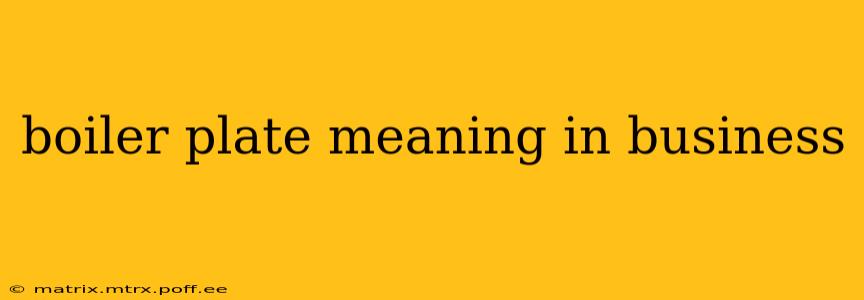In the business world, the term "boilerplate" refers to standard text that is reused across multiple documents. It's essentially a template or pre-written section used to save time and ensure consistency in legal, marketing, and other business materials. Think of it as a building block that forms part of a larger document, rather than the document itself. While often associated with legal documents, boilerplate text is used far more broadly than that.
This guide will explore the meaning of boilerplate in business, its various applications, and why it's such a crucial tool for efficiency and legal compliance.
What Does Boilerplate Mean in Legal Documents?
In a legal context, boilerplate typically consists of standard clauses or sections included in contracts, agreements, and other legal instruments. These clauses often address issues such as:
- Governing Law: Specifies which jurisdiction's laws will govern the agreement.
- Dispute Resolution: Outlines the methods for resolving disagreements between parties, such as arbitration or litigation.
- Confidentiality: Protects sensitive information shared during the course of the agreement.
- Entire Agreement: States that the written document constitutes the complete agreement between the parties, excluding prior agreements or understandings.
- Severability: Ensures that if one part of the agreement is deemed invalid, the remaining parts remain enforceable.
- Notices: Specifies how and where formal notices should be delivered.
- Assignment: Defines whether or not the agreement can be transferred to a third party.
These clauses, while seemingly standard, are crucial for clarity, risk mitigation, and legal compliance. Including properly drafted boilerplate ensures that the agreement is comprehensive and protects the interests of all involved parties.
Boilerplate in Marketing and Other Business Documents
Beyond legal documents, boilerplate text also appears frequently in marketing materials, website content, and press releases. This type of boilerplate often includes:
- Company Descriptions: A concise and consistent summary of a company's mission, values, and services.
- Biographies: Standardized information about key personnel.
- Contact Information: Standard contact details used across various platforms.
- Copyright Notices: Protecting intellectual property rights.
- Terms of Service/Privacy Policies: Legal boilerplate elements for online platforms.
Using boilerplate in these areas streamlines the creation of marketing materials and ensures brand consistency. It saves time and resources by avoiding the need to rewrite the same information repeatedly.
Why Is Boilerplate Important in Business?
The importance of boilerplate in the business world boils down to several key benefits:
- Efficiency: Saves significant time and effort by reusing standardized text.
- Consistency: Ensures consistent messaging and branding across all materials.
- Accuracy: Reduces the risk of errors and omissions by using pre-approved language.
- Legal Compliance: Protects businesses from potential legal issues by including necessary clauses.
- Cost Savings: Reduces the cost associated with drafting and reviewing documents.
Are there downsides to using boilerplate?
While extremely useful, overuse or inappropriate use of boilerplate can have some drawbacks:
- Lack of personalization: Overreliance on boilerplate can make documents feel generic and impersonal.
- Outdated information: Boilerplate must be regularly reviewed and updated to ensure accuracy.
- Potential for misapplication: Incorrectly applying or adapting boilerplate to a specific situation can create legal risks.
How to Effectively Use Boilerplate in Your Business
To maximize the benefits of boilerplate, consider these best practices:
- Create a central repository: Store all boilerplate text in a central location, accessible to all relevant personnel.
- Regular review and updates: Ensure that boilerplate is regularly reviewed and updated to reflect changes in laws, regulations, and company information.
- Contextual adaptation: While using pre-written text is efficient, it's crucial to adapt the boilerplate to the specific context of each document.
- Seek legal counsel: When dealing with legal documents, always consult with legal professionals to ensure that the boilerplate is appropriate and legally sound.
In conclusion, understanding the meaning and application of boilerplate is essential for any business. By using boilerplate effectively, businesses can streamline their operations, maintain consistency, mitigate legal risks, and ultimately save valuable time and resources. However, careful management and regular review are key to avoiding potential pitfalls.
